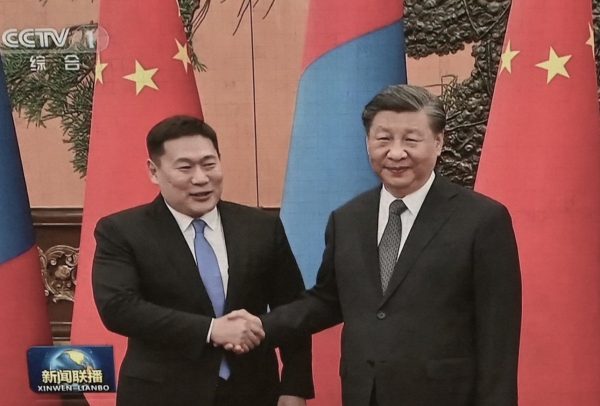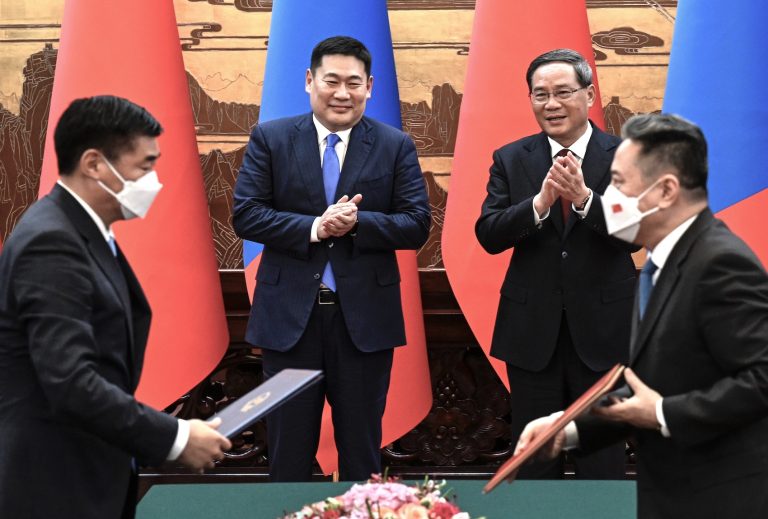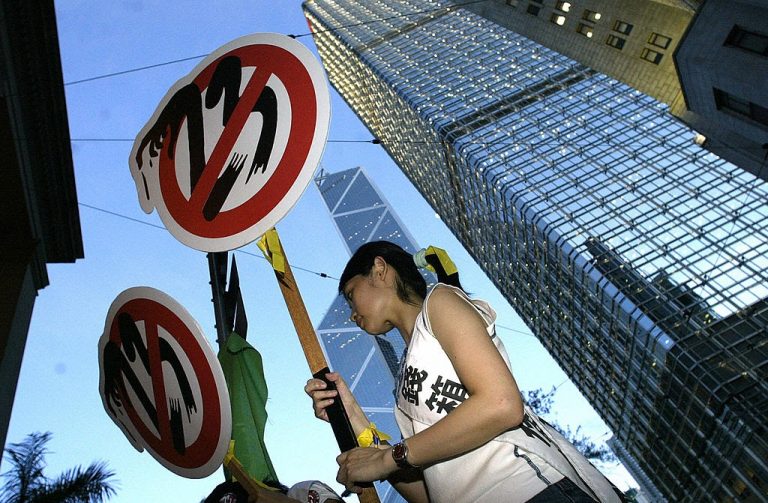Luvsannamsrain Oyun-Erdene, the prime minister of Mongolia, recently completed a trip to neighboring China, where he visited the cities of Beijing, Tianjin, and Ningbo between June 26 and July 1.
During the trip, Oyun-Erdene met with Chinese leader Xi Jinping and premier Li Qiang. Their discussions mainly focused on economic ties, and a number of agreements were finalized between the two countries.
The meeting with Xi, which took place on June 27 in the Great Hall of the People, “revealed Ulaanbaatar and Beijing’s shared interest in enriching the two countries’ economic ties within the framework of their comprehensive strategic partnership,” according to a July 6 report by The Diplomat.
The Tokyo-based publication noted the growing importance of China in Mongolia’s foreign trade, especially over the last five years. In particular, Mongolia has leaned on the communist regime for development of its mining and export sector.
Though over twice the size of Texas, Mongolia has a population of just 3.3 million — less than the state of Oregon — and is landlocked. Its only neighbors are China to the south and Russia in the north.
Success
You are now signed up for our newsletter
Success
Check your email to complete sign up
China has been Mongolia’s main trading partner for many years in a row, with the value of goods passing across the border exceeding US$10 billion in 2021 and 2022, according to Beijing.
Speaking with Xi, Oyun-Erdene said that Mongolia was “ready to work closely with China” on the understanding that the two countries would “continue respecting and supporting each other’s choice of development paths,” according to the Chinese foreign ministry’s readout of the meeting.
He called for the promotion of “high-quality” cooperation on the China-funded Belt and Road Initiative (BRI), the multi-trillion-dollar projects that the Chinese Communist Party (CCP) has been pushing abroad since 2013 and which is a keystone component of Xi’s policy.
In addition, the Mongolian prime minister stressed the development of “cross-border railways and port connectivity” as well as greater cooperation in “economy and trade, investment, energy, green development, anti-corruption, and other areas.”

Xi, for his part, emphasized commitment to “respecting each other’s national independence, sovereignty, and territorial integrity” while “firmly supporting each other on issues involving their respective core interests and major concerns,” per the Foreign Ministry.
On June 28, Oyun-Erdene met with Chinese Premier Li Qiang, who took office at the beginning of the year. The two agreed to increase activity at border crossings between China and Mongolia, as well as to expand the number of rail links.
According to Mongolian news outlet Montsame, the “Mongolia-China Trade and Economic Cooperation Forum,” which was held during Oyun-Erdene’s visit, saw the signing of over two dozen cooperation agreements totalling around US$414 million.
In addition, the Mongolian prime minister attended the concurrent World Economic Forum meeting in Tianjin, and met with executives of various Chinese state-owned enterprises (SOEs), including mining and industrial concerns. Among these was Norinco, a major Chinese defense manufacturer.
Though Mongolia became a democracy following the collapse of the Soviet Union in 1991, the country has been increasingly pulled into Beijing’s orbit. In her piece for The Diplomat, researcher Bolor Lkhaajav noted that 95 percent of Mongolia’s exports go to China, making it largely reliant on the communist superpower.
“It’s no secret that Mongolia’s main trading and economic partner is China, so we need to enhance the capacity of our border ports,” Oyun-Erdene later told CCP-run broadcaster CCTV. “At present, the only connection with China via railway is the Zamyn-Uud railway port. So we plan to increase the railway ports to four within the next one to two years,” he added.
In addition, during the prime minister’s time in Tianjin, he “held talks with Tianjin Port Group on how to export Mongolia’s energy resources to other countries by sea.”
Oyun-Erdene in his interview with CCTV talked up the “Welcome to Mongolia” cultural exchange event that was held together with the Economic Trade Cooperation Forum between the two countries, saying that the events “fully reflect[ed] the good relationship of mutual trust among people and enterprises” between Mongolia and China.
Even while courting Mongolian political and business leaders, Communist China has not spared ethnic Mongolians from cultural and political persecution.
The majority of ethnic Mongolians, nearly 6 million people, live in China’s Inner Mongolia region. During the Cultural Revolution, the Mongolians suffered large-scale massacres bordering on genocide, while in recent years, the CCP has enacted educational policies barring or heavily restricting Mongolian-language instruction in Inner Mongolia.
Protests broke out across the region in autumn 2020 in response to the repressive policies, with some Mongolian-language teachers even committing suicide in despair.















